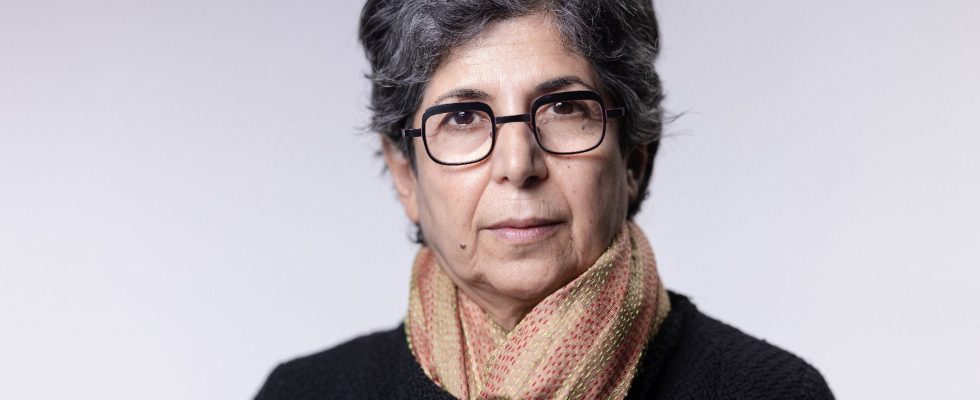In front of his computer screen, on the third floor of the International Research Center, a unit shared by Sciences Po and the CNRS, Fariba Adelkhah grumbles, scolds, tries again a combination – suddenly working – and assures that “before” he never had one. was not like that. “Before”, she mechanically dialed the key to her computer, the combination of her credit card, that of her digital code, “before”, it was full life, whole life, life in her hands, the one that ended at Tehran airport, in June 2019, when the Franco-Iranian researcher, specialist in Shiism and post-revolutionary Iran, was arrested as she came to welcome her companion Roland Marchal for a few days of vacation.
Sentenced to five years in prison for “endangering national security”, the academic is incarcerated in the women’s section of Evin central prison – forty inmates in one room. According to court decisions, she benefited from a short house arrest, then was incarcerated again in January 2022, returning to house arrest until her release last February. Nine months later, on October 18, she landed in Paris. Welcomed triumphantly by the teachers, staff, management and students of Political science, the anthropologist pronounces words of gratitude, then under the astonished gaze of his peers, begins to sing. Yes she sings, as she sang through the walls of her dungeon, as she sang with the Nobel Peace Prize winner Nargues Mohammadi, 51 years old, vice-president of the center for the defense of human rights, detained alongside her, like her sang revolutionary songs every day with the young prisoners. She sings, she will sing. An anecdote ? Far from there. She takes advantage of this point to expose, in a soft voice, delicate words, the clerical arbitrariness of Muslim fundamentalists, except that she does not formulate it like this, she recounts the first four months of her detention with only the Koran and the Shiite religious book “The Keys of Paradise”. Two works in which she discovers that singing forbidden to women is nowhere mentioned. It is men who have enslaved the texts to their misogynistic madness, men and not these books, in which she does not believe, just as she does not believe in any God, but whose significance she respects and questions. Everything about her moves like this lesson around singing, women and Islam: erudite nuance, fierce concern to open our Western gates to complexity. She adds that she dreams of living in Qom, the holy city, an “Iranian Oxford, only bookstores, libraries, thinkers!”, Qom where a theologian, subversive and orthodox, had accepted her in class, on the condition that her little table is off-center. And how much this man, critic of the Mullahs’ regime, impressed him with his immense culture.
Praline and paradise
His singing return to Sciences Po took place on a Friday. On Monday, she opens her office, cluttered with boxes that she slowly puts away. Feather silhouette, hair now short, she offers tea, coffee, finally handing out a packet. On the paper surrounding the praline, a paper with a quote from George Sand defining paradise as the kiss of two lovers. She smiles, a little cutesy, no? How to define paradise? Once again, she digresses – exquisite finesse fleeing categories, those drawers where thought is buried. Could we now talk about his detention? She says kindly, in a thin voice, wishing not to be “reduced to something, not to be a prisoner in Iran for four and a half years.”
Then, she talks about prunes, we think she’s lost, what’s the connection? Stomach sick, caretakers who don’t care, she stops eating in the evening, nothing helps, pain. One day, she asked a head guard to bring her a prune, just one. She turns her head. And then, some time later, the door to the dungeon ajar, a plastic bag thrown on the ground. Inside, four prunes. Fariba Adelkhah specifies that she never saw this employee again; Was she punished for her compassion? Did she know from the start what made her leniency possible? Why did you agree to act against the rules? She says she was not mistreated, that the worst torture is that which requires blows to inflict invisible wounds. “They will not give me back these four years that they took from me, this government has done its job as an authoritarian regime by taking my life and so many others,” she adds. In his apartment in Qom, the regime’s henchmen took away his computer, hard drives, ten notebooks, “twenty-seven years of my professional life gone.” After her release, and before her return to France, she hoped to recover these documents, instructed her lawyer, waited. Detained arbitrarily, released just as obscurely, she recounts these months of dizziness in Tehran. Her lawyer had recommended that she wear the veil; it would be too stupid to provide them with an excuse. She balked, gave in, then seeing that the women around them dared to walk bareheaded, she imitated them. Scarf placed on the shoulders, ready to be hoisted over the hair, just in case.
One day, she asked why at every crossroads in the city, young men are limply repairing mopeds. The same, morning, noon, and evening. These men are lookouts, intelligence agents, there to spot hair in the air. She would like to be able to work, as she always did. “And then,” she laughs, “I’m paid by the taxpayer for that, right?”, but her head is scattered, the books are escaping her, the words are spinning. She’s crying. Confides “not wanting to know anything, I am in front of a wall; why have the other Iranian academics with whom I have been interacting for years done nothing for me? Thirty years of relationships with local researchers, students reduced to nothing “. She pulls herself together, would like to conclude that “the only really serious thing is not me, my story, it is that here in France no more students are doing a thesis on Iran.”
.
